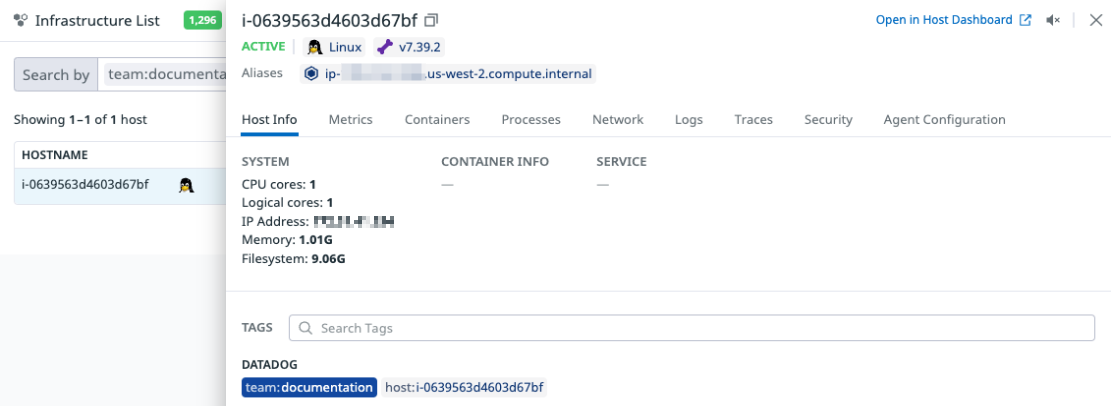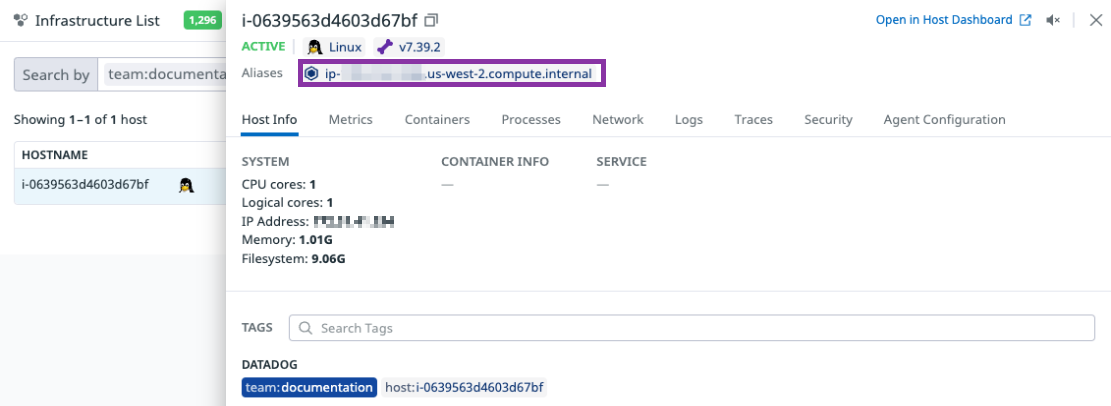- Essentials
- Getting Started
- Datadog
- Datadog Site
- DevSecOps
- Serverless for AWS Lambda
- Agent
- Integrations
- Containers
- Dashboards
- Monitors
- Logs
- APM Tracing
- Profiler
- Tags
- API
- Service Catalog
- Session Replay
- Continuous Testing
- Synthetic Monitoring
- Incident Management
- Database Monitoring
- Cloud Security Management
- Cloud SIEM
- Application Security Management
- Workflow Automation
- CI Visibility
- Test Visibility
- Test Impact Analysis
- Code Analysis
- Learning Center
- Support
- Glossary
- Standard Attributes
- Guides
- Agent
- Integrations
- OpenTelemetry
- Developers
- Authorization
- DogStatsD
- Custom Checks
- Integrations
- Create an Agent-based Integration
- Create an API Integration
- Create a Log Pipeline
- Integration Assets Reference
- Build a Marketplace Offering
- Create a Tile
- Create an Integration Dashboard
- Create a Recommended Monitor
- Create a Cloud SIEM Detection Rule
- OAuth for Integrations
- Install Agent Integration Developer Tool
- Service Checks
- IDE Plugins
- Community
- Guides
- Administrator's Guide
- API
- Datadog Mobile App
- CoScreen
- Cloudcraft
- In The App
- Dashboards
- Notebooks
- DDSQL Editor
- Sheets
- Monitors and Alerting
- Infrastructure
- Metrics
- Watchdog
- Bits AI
- Service Catalog
- API Catalog
- Error Tracking
- Service Management
- Infrastructure
- Application Performance
- APM
- Continuous Profiler
- Database Monitoring
- Data Streams Monitoring
- Data Jobs Monitoring
- Digital Experience
- Real User Monitoring
- Product Analytics
- Synthetic Testing and Monitoring
- Continuous Testing
- Software Delivery
- CI Visibility
- CD Visibility
- Test Optimization
- Code Analysis
- Quality Gates
- DORA Metrics
- Security
- Security Overview
- Cloud SIEM
- Cloud Security Management
- Application Security Management
- AI Observability
- Log Management
- Observability Pipelines
- Log Management
- Administration
Infrastructure List
Overview
The Infrastructure list shows all of your hosts monitored by Datadog with activity during the last two hours (default) and up to one week. Search your hosts or group them by tags. In Datadog, navigate to Infrastructure > Hosts to view the Infrastructure list. This list should not be used to estimate your infrastructure host billing. See the billing page to learn about billing.
Hosts
The following information is displayed in the infrastructure list for your hosts:
- Hostname
- The preferred hostname alias (use the Options menu to view Cloud Name or Instance ID).
- Cloud Name
- A hostname alias.
- Instance ID
- A hostname alias.
- Status
- Displays
ACTIVEwhen the expected metrics are received and displaysINACTIVEif no metrics are received. - CPU
- The percent of CPU used (everything but idle).
- IOWait
- The percent of CPU spent waiting on the IO (not reported for all platforms).
- Load 15
- The system load over the last 15 minutes.
- Apps
- The Datadog integrations reporting metrics for the host.
- Operating System
- The tracked operating system.
- Cloud Platform
- Cloud platform the host is running on (for example, AWS, Google Cloud, or Azure).
- Datadog Agent
- Agent version that is collecting data on the host.
- OpenTelemetry
- OpenTelemetry Collector version that is collecting data on the host.
Hostname
The Datadog Agent collects potential hostnames from several different sources. For more details, see How does Datadog determine the Agent hostname?.
Note: Hostnames should be unique within a Datadog account, otherwise you may experience some inconsistencies on your host graphs.
Inspect
Click on any host to view more details including:
- aliases
- tags
- metrics
- containers
- logs (if enabled)
- Agent configuration (if enabled)
Aliases
Datadog creates aliases for host names when there are multiple uniquely identifiable names for a single host. The names collected by the Agent are added as aliases for the chosen canonical name. For example, a single host running in EC2 might have an instance ID (i-abcd1234), a generic hostname provided by EC2 based on the host’s IP address (ip-192-0-0-1), and a meaningful host name provided by an internal DNS server or a config-managed hosts file (myhost.mydomain).
Agent configuration
Join the Beta!
The Agent configuration view is in public beta and is available in Agent versions >= 7.39/6.39. Starting with Agent version >= 7.47/6.47, this feature is enabled by default.
The Agent can send its own configuration to Datadog to be displayed in the Agent Configuration section of the host detail panel.
The Agent configuration is scrubbed of any sensitive information and only contains configuration you’ve set using the configuration file or environment variables. The configuration changes are updated every 10 minutes.
This feature is enabled by default in Agent version >= 7.47.0/6.47.0.
To modify this behavior, set the value of inventories_configuration_enabled in your Agent configuration file to true to send the configuration, or false to disable it.
Alternatively, use the DD_INVENTORIES_CONFIGURATION_ENABLED environment variable to enable or disable this feature.
Export
For a JSON formatted list of your hosts reporting to Datadog, use one of the following:
- The JSON API permalink at the top of the infrastructure list.
- The search hosts API endpoint - see the developer guide for an example.
Agent version
At times it may also be prove useful to audit your Agent versions to ensure you are running the latest version. To accomplish this, use the get_host_agent_list script, which leverages the JSON permalink to output the current running Agents with version numbers. There is also a json_to_csv script to convert the JSON output into a CSV file.
No Agent
Another use case of the JSON export would be to get a list of Amazon EC2 (excluding RDS) instances with no Agent installed. These instances appear in the infrastructure list by setting up your AWS account in the Datadog AWS integration tile. See the Python3 script below:
# 3p
import requests
# stdlib
import json
import pprint
import os
api_key = os.environ['DD_API_KEY']
app_key = os.environ['DD_APP_KEY']
url = "https://app.datadoghq.com/reports/v2/overview?\
window=3h&with_apps=true&with_sources=true&with_aliases=true\
&with_meta=true&with_tags=true&api_key=%s&application_key=%s"
infra = json.loads(requests.get(url %(api_key,app_key)).text)
for host in infra['rows']:
if (('aws' in host['apps']) and ('rds' not in host['apps']) and ('agent' not in host['apps'])):
try:
print(f'HOST: {host["name"]} - TAGS: {host["tags_by_source"]}')
except:
pass
Further Reading
Additional helpful documentation, links, and articles:



